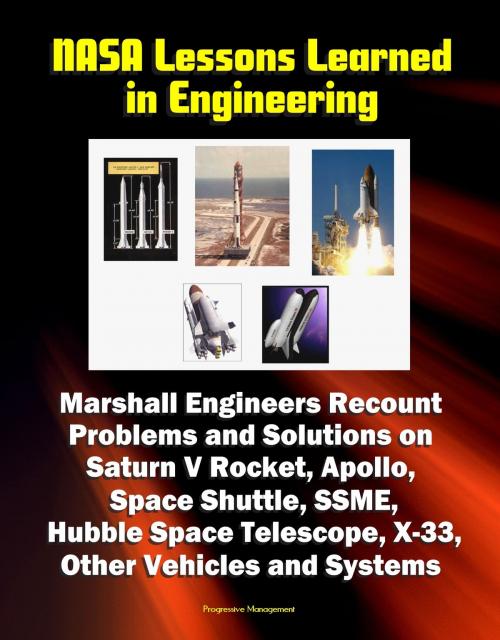NASA Lessons Learned in Engineering: Marshall Engineers Recount Problems and Solutions on Saturn V Rocket, Apollo, Space Shuttle, SSME, Hubble Space Telescope, X-33, Other Vehicles and Systems
Nonfiction, Science & Nature, Technology, Quality Control, Aeronautics & Astronautics| Author: | Progressive Management | ISBN: | 9781310620089 |
| Publisher: | Progressive Management | Publication: | August 13, 2014 |
| Imprint: | Smashwords Edition | Language: | English |
| Author: | Progressive Management |
| ISBN: | 9781310620089 |
| Publisher: | Progressive Management |
| Publication: | August 13, 2014 |
| Imprint: | Smashwords Edition |
| Language: | English |
This report is a fascinating and authoritative compilation of lessons learned in approximately 55 years of engineering experience by three Marshall Space Flight Center engineers, James C. Blair, Robert S. Ryan, and Luke A. Schutzenhofer. The lessons are the basis of a course on lessons learned that has been taught at Marshall. The lessons are drawn from NASA space projects and are characterized in terms of generic lessons learned from the project experience, which are further distilled into overarching principles that can be applied to future projects. Included are discussions of the overarching principles followed by a listing of the lessons associated with that principle. The lesson with sub-lessons are stated along with a listing of the project problems the lesson is drawn from, then each problem is illustrated and discussed, with conclusions drawn in terms of Lessons Learned. The purpose of this report is to provide principles learned from past aerospace experience to help achieve greater success in future programs, and identify application of these principles to space systems design. The problems experienced provide insight into the engineering process and are examples of the subtleties one experiences performing engineering design, manufacturing, and operations.
Programs and systems discussed in this report include: Redstone, Jupiter, Saturn, Saturn V, Apollo, HEAO, Skylab, HST, Space Shuttle, X-33, Space Station, SLI, SSME Space Shuttle Main Engine, Tethered Satellite, STS-1 aerodynamic anomaly and solution, SRM ignition overpressure, Saturn V rate gyro deflection, aft skirt failure, Gravity Probe, SSME fatigue issues, SRB reentry acoustics, Saturn V sloshing computer program, ISS load paths, Saturn V structural capability, Saturn V hold down post liftoff loads, Shuttle liftoff loads, Solar Array Flight Experiment (SAFE) Day-Night Frequency Shift, SRM Thrust Bucket and SSME Throttling (Lofting vs. Throttling), and more.
INTRODUCTION * DISCUSSION OF LESSONS LEARNED PRINCIPLES * Principle I. System Success Depends on the Creativity, Judgment, and Decision-Making Skills of the People * Lesson 1. People are Prime Resource for Project Success * Lesson 2. People Skills are Mandatory for Achieving Successful Products * Principle II. Space Systems are Challenging, High Performance Systems * Lesson 3. Demand for High Performance Leads to High Power Densities and High Sensitivities * Principle III. Everything Acts as a System (Whole) * Lesson 4. Systems Engineering and Technical Integration is the Linchpin of Project Success * Lesson 5. Risk Management * Lesson 6. All Design is a Paradox, a Balancing Act * Principle IV. The System is Governed by the Laws of Physics * Lesson 7. Physics of the Problems Reigns Supreme * Lesson 8. Engineering is a Logical Thought Process * Lesson 9. Mathematics is the Same! * Lesson 10. Fundamentals of Launch Vehicle Design * Principle V. Robust Design is Based on Our Understanding of Sensitivities, Uncertainties, and Margins * Lesson 11. Robustness * Lesson 12. Understanding Sensitivities and Uncertainties is Mandatory * Lesson 13. Program Margins Must be Adequate * Principle VI. Project Success is Determined by Life Cycle Considerations * Lesson 14. The Design Space is Constrained Based on Where You are in the Life Cycle * Lesson 15. Concept Selection and Design Process * Lesson 16. Requirements Drive the Design * Lesson 17. Designing for the -Ilities and Cost * Principle VII. Testing and Verification Have an Essential Role in Development * Lesson 18. Hardware and Data Have the Answers * Lesson 19. Can Test Now or You Will Test Later * Lesson 20. Independent Analysis, Test, and Design Keys to Success * Lesson 21. All Analyses and Tests are Limited * Lesson 22. Scaling is a Major Issue * Principle VIII. Anticipating and Surfacing Problems Must be Encouraged * Lesson 23. Must Hear and Understand All Technical and Programmatic Opinions * Lesson 24. There are No Small Changes!
This report is a fascinating and authoritative compilation of lessons learned in approximately 55 years of engineering experience by three Marshall Space Flight Center engineers, James C. Blair, Robert S. Ryan, and Luke A. Schutzenhofer. The lessons are the basis of a course on lessons learned that has been taught at Marshall. The lessons are drawn from NASA space projects and are characterized in terms of generic lessons learned from the project experience, which are further distilled into overarching principles that can be applied to future projects. Included are discussions of the overarching principles followed by a listing of the lessons associated with that principle. The lesson with sub-lessons are stated along with a listing of the project problems the lesson is drawn from, then each problem is illustrated and discussed, with conclusions drawn in terms of Lessons Learned. The purpose of this report is to provide principles learned from past aerospace experience to help achieve greater success in future programs, and identify application of these principles to space systems design. The problems experienced provide insight into the engineering process and are examples of the subtleties one experiences performing engineering design, manufacturing, and operations.
Programs and systems discussed in this report include: Redstone, Jupiter, Saturn, Saturn V, Apollo, HEAO, Skylab, HST, Space Shuttle, X-33, Space Station, SLI, SSME Space Shuttle Main Engine, Tethered Satellite, STS-1 aerodynamic anomaly and solution, SRM ignition overpressure, Saturn V rate gyro deflection, aft skirt failure, Gravity Probe, SSME fatigue issues, SRB reentry acoustics, Saturn V sloshing computer program, ISS load paths, Saturn V structural capability, Saturn V hold down post liftoff loads, Shuttle liftoff loads, Solar Array Flight Experiment (SAFE) Day-Night Frequency Shift, SRM Thrust Bucket and SSME Throttling (Lofting vs. Throttling), and more.
INTRODUCTION * DISCUSSION OF LESSONS LEARNED PRINCIPLES * Principle I. System Success Depends on the Creativity, Judgment, and Decision-Making Skills of the People * Lesson 1. People are Prime Resource for Project Success * Lesson 2. People Skills are Mandatory for Achieving Successful Products * Principle II. Space Systems are Challenging, High Performance Systems * Lesson 3. Demand for High Performance Leads to High Power Densities and High Sensitivities * Principle III. Everything Acts as a System (Whole) * Lesson 4. Systems Engineering and Technical Integration is the Linchpin of Project Success * Lesson 5. Risk Management * Lesson 6. All Design is a Paradox, a Balancing Act * Principle IV. The System is Governed by the Laws of Physics * Lesson 7. Physics of the Problems Reigns Supreme * Lesson 8. Engineering is a Logical Thought Process * Lesson 9. Mathematics is the Same! * Lesson 10. Fundamentals of Launch Vehicle Design * Principle V. Robust Design is Based on Our Understanding of Sensitivities, Uncertainties, and Margins * Lesson 11. Robustness * Lesson 12. Understanding Sensitivities and Uncertainties is Mandatory * Lesson 13. Program Margins Must be Adequate * Principle VI. Project Success is Determined by Life Cycle Considerations * Lesson 14. The Design Space is Constrained Based on Where You are in the Life Cycle * Lesson 15. Concept Selection and Design Process * Lesson 16. Requirements Drive the Design * Lesson 17. Designing for the -Ilities and Cost * Principle VII. Testing and Verification Have an Essential Role in Development * Lesson 18. Hardware and Data Have the Answers * Lesson 19. Can Test Now or You Will Test Later * Lesson 20. Independent Analysis, Test, and Design Keys to Success * Lesson 21. All Analyses and Tests are Limited * Lesson 22. Scaling is a Major Issue * Principle VIII. Anticipating and Surfacing Problems Must be Encouraged * Lesson 23. Must Hear and Understand All Technical and Programmatic Opinions * Lesson 24. There are No Small Changes!















